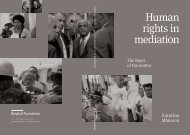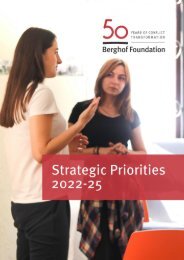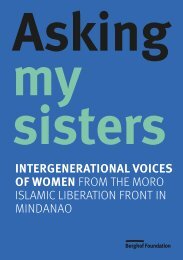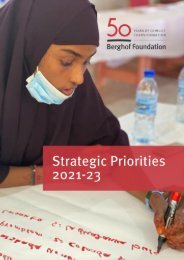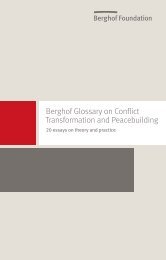Berghof Foundation: 50 years of conflict transformation
This book provides an overview of the Berghof Foundation’s work and impact over the past 50 years and sheds light on the challenges ahead of peacebuilding.
This book provides an overview of the Berghof Foundation’s work and impact over the past 50 years and sheds light on the challenges ahead of peacebuilding.
Create successful ePaper yourself
Turn your PDF publications into a flip-book with our unique Google optimized e-Paper software.
Lorem Ipsum<br />
Afghanistan<br />
“<br />
Conciliation and nonviolent <strong>conflict</strong> <strong>transformation</strong><br />
will stay the only viable path in Afghanistan.<br />
For the past seven <strong>years</strong>, we have supported Afghan<br />
partners in that endeavour and we will continue to do<br />
so during the current <strong>transformation</strong> process and for<br />
as long as our support is requested and useful.<br />
2019<br />
Hans-Joachim Giessmann<br />
Director Emeritus<br />
<strong>Bergh<strong>of</strong></strong> <strong>Foundation</strong><br />
Turning<br />
confrontation<br />
into engagement<br />
Intra-Afghan<br />
Conference<br />
for Peace<br />
On 7 and 8 July 2019, in a historic first,<br />
representatives <strong>of</strong> the Afghan government and<br />
society and the Taliban (all in their personal<br />
capacity) sat down together for a dialogue meeting<br />
in Doha, Qatar. The Intra-Afghan Conference<br />
for Peace, co-hosted by the German and Qatari<br />
governments, brought together 61 Afghans from<br />
a wide range <strong>of</strong> political and societal groups to<br />
discuss shared interests and the question <strong>of</strong> what<br />
a peace process could eventually look like. Having<br />
previously provided key Afghan stakeholders with<br />
various capacity-building and training measures<br />
for several <strong>years</strong>, the <strong>Bergh<strong>of</strong></strong> <strong>Foundation</strong> was<br />
invited by the German government to support the<br />
preparation and implementation <strong>of</strong> this event.<br />
The closed-door sessions, moderated by the<br />
<strong>Bergh<strong>of</strong></strong> <strong>Foundation</strong>, allowed for an initial building<br />
<strong>of</strong> trust and a common understanding <strong>of</strong> shared<br />
grievances and pain. This was particularly<br />
challenging in light <strong>of</strong> the deep mistrust and<br />
suspicion between the parties, created by four<br />
decades <strong>of</strong> armed <strong>conflict</strong>. Through an open<br />
and unfiltered exchange, participants found<br />
significant common ground and identified issues<br />
<strong>of</strong> divergence and disagreement. At the end,<br />
they approved a joint declaration, which was<br />
widely considered by the public to be a first step<br />
towards an inclusive peace process. All sides<br />
agreed to reduce violence and gave assurances<br />
on fundamental rights for women and religious<br />
minorities. The resolution also called for trustbuilding<br />
measures and outlined a roadmap for<br />
an inclusive peace process.<br />
Upon their return to Kabul, civil society<br />
activists welcomed the participants with flowers<br />
and the release <strong>of</strong> peace doves as an expression<br />
<strong>of</strong> the hope generated by the event within Afghan<br />
society. That hope and optimism have been<br />
severely tested since then. The path to intra-<br />
Afghan negotiations, which finally started in<br />
September 2020, was paved with disillusionment<br />
and setbacks amid ongoing and escalating violence<br />
in almost all parts <strong>of</strong> Afghanistan. However, after<br />
four decades <strong>of</strong> armed <strong>conflict</strong>, it has become clear<br />
to most people that the <strong>conflict</strong> cannot be solved<br />
by military means nor can the solution be dictated<br />
from the outside. While support from international<br />
actors is <strong>of</strong>ten welcomed by all sides, only a truly<br />
Afghan-owned and Afghan-led process can bring<br />
about viable solutions, a reduction in violence<br />
and, ultimately, a sustainable, comprehensive and<br />
dignified peace.<br />
76<br />
77





